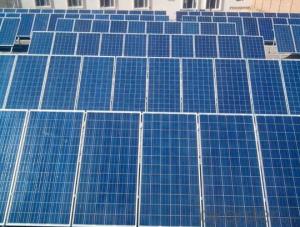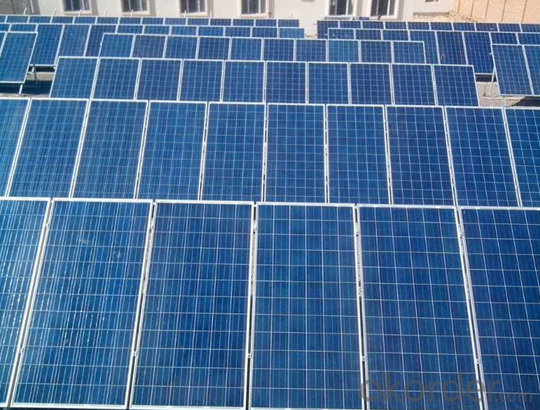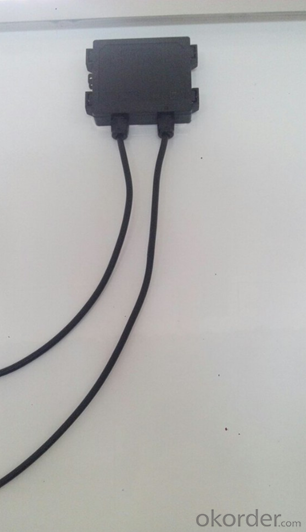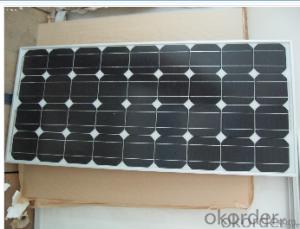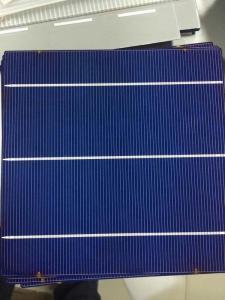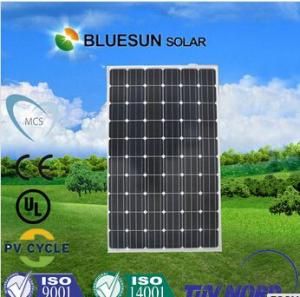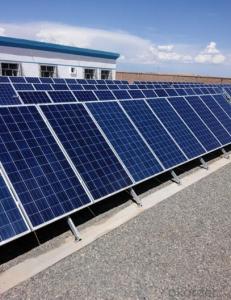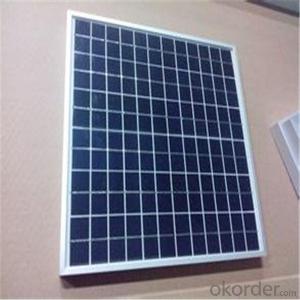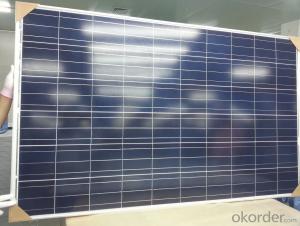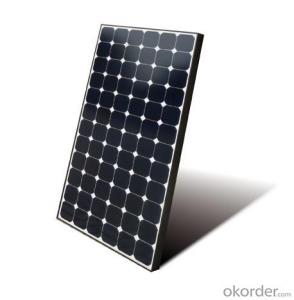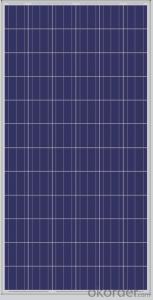Sun Power Solar Panels for Sale - 300w Poly Silicon Solar Module / 300watt Solar Panel with Outlet CNBM
- Loading Port:
- Qingdao
- Payment Terms:
- TT OR LC
- Min Order Qty:
- 10 set
- Supply Capability:
- 300000 set/month
OKorder Service Pledge
OKorder Financial Service
You Might Also Like
Quick Details
| Place of Origin: | China (Mainland) | Brand Name: | CNBM | Model Number: | 285W solar module |
| Material: | Polycrystalline Silicon | Size: | 1956*992*50mm | Number of Cells: | 72 |
| Max. Power: | 285W | Cell Size(mm): | 156*156 | Tolerance: | 0~3% |
| Cells Number(pcs): | 6*12 | Weight(Kg): | 25 | Max.Series Fuse Rating (A): | 15 |
| Max.System Voltage-IEC(V): | 1000 |
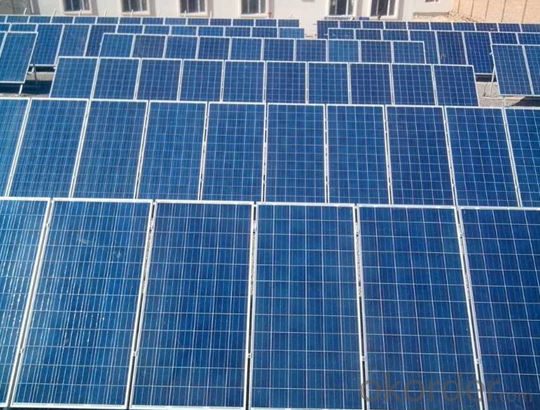
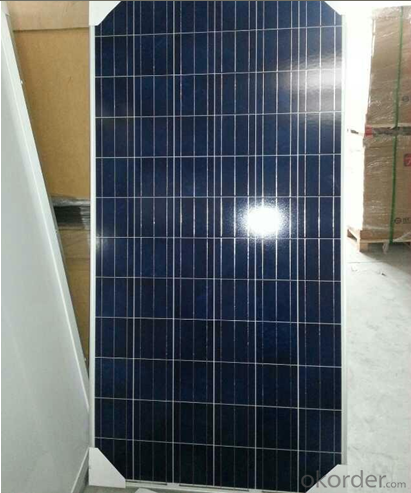
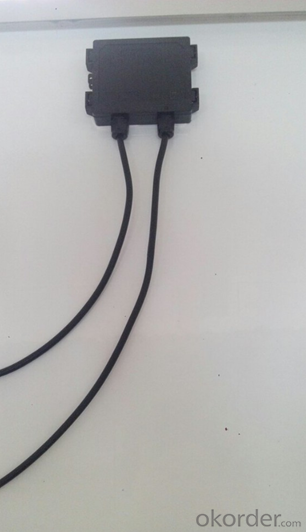
Polycrystalline Solar Module
XH250P(72)/ XH275P(72)/ XH300P(72)
Models | XH250P(72) | XH285P(72) | XH300P(72) |
Max. Power (Pmax) | 250Wp | 285Wp | 300Wp |
Optimum Operating Voltage (Vm) | 34.8V | 35.7V | 35.9V |
Optimum Operating Current (Im) | 7.18A | 7.77 A | 8.08A |
Open-circuit Voltage (Voc) | 43.8V | 35.4 V | 44.4V |
Short-circuit Current (Isc) | 8.04A | 8.24 A | 8.62A |
Cells efficiency | 14.6% | 15.8% | 16.8% |
Dimension L×W×H (mm) | 1956×992×50mm | 1956×992×50 | 1956×992×50 |
Power Tolerance (Pmax) | 0 ~ +3% | 0 ~ +3% | 0 ~ +3% |
Numbers of cells | 60pcs poly solar cell 156×156mm | 72pcs poly solar cell 156×156mm | 72pcs poly solar cell 156×156mm |
weight | 25kg | 25kg | 25kg |
Max system voltage | 1000V DC | 1000V DC | 1000V DC |
Temperature cycling range | -40℃ ~ +85℃ | -40℃ ~ +85℃ | -40℃ ~ +85℃ |
- Q: Can solar panels be used in commercial buildings?
- Yes, solar panels can definitely be used in commercial buildings. In fact, many businesses are increasingly installing solar panels on their rooftops or in open spaces to generate clean and renewable energy. This helps reduce their reliance on traditional grid electricity and lowers their operational costs in the long run. Additionally, commercial buildings often have ample roof space, making them ideal for maximizing solar energy generation.
- Q: Are there any health risks associated with solar panels?
- There are no direct health risks associated with solar panels. However, improper installation or maintenance may pose electrical hazards, and exposure to high temperatures or falling from heights during installation can lead to accidents. Additionally, some solar panels contain small amounts of hazardous materials, but they are tightly sealed and the risk of exposure is minimal. Overall, when installed and maintained correctly, solar panels are safe and have numerous environmental and health benefits.
- Q: If you were to shine, for example, heat lamps onto the solar panel along with the sun, will the solar panel eventually not work? Or will they produce more light as long as more light is directed onto them.
- Solar panels do not wear out the way machinery does. The semiconductors used give up electrons by receiving photons, and do not experience a net deficit of particles. However, if you placed a heat source such as a heat lamp too close to a solar panel, you could damage the panel by overheating it, which would denature the semiconductors or cause damage by scorching or melting. The problem would be the heat, not the light. Solar panels do have a finite life expectancy, though it is several decades under normal circumstances. The panels will eventually become scratched, warped, and dented. The electrical conductors will eventually be broken by metal fatigue as the panels heat and cool on a daily basis. So they will die of old age, but they don't wear out in an electrochemical sense.
- Q: Do solar panels require regular inspections?
- Yes, solar panels do require regular inspections to ensure their optimal performance and detect any potential issues or damage that may affect their efficiency.
- Q: I am looking to buy a solar panel.What does it mean when in the title it says 200 watts, or 50 watts?
- It's okorder / for more details.
- Q: solar panels are way too expensive to buy, can they be homemade cheaply? i want at least 500 watts. everyone on the web sells these instructions, but i'd like a link to free info, if it is really possible for a non-sciencey person to make. thank you
- The idea is to hand assemble scrap solar cells that would otherwise be thrown out. At one point in time, very few people would want to do this so you could get the broken solar cells for free but now they sell them by the watt. It's still cheaper than a pre-fabricated solar panel but it's very labour intensive. Technically it's like wiring a bunch of batteries together, you measure the voltage and current a broken cell produces and decide whether or not to wire it in series or in parallel with other cells to get the performance characteristics that you want plus try to fit them onto some kind of structural panel in a fashion that uses the space efficiently. Since your handiwork is likely to be fragile, you'll probably have to put some plate glass on top to protect the cells from the elements, you can also improve performance by positioning fresnel lenses to increase the amount of light on active elements versus inactive areas of the panel.
- Q: Could you throw some long scientific words in with your answer so I can impress my teacher, I'm looking to expand my scientific vocab. Thanks
- Actually Photovoltaic cells also called solar cells in collection forms solar panel. Photovoltaic cells consist of silicon for converting solar energy into electrical energy.
- Q: Can solar panels be used in remote areas with no access to the grid?
- Yes, solar panels can be used in remote areas with no access to the grid. Solar panels generate electricity from sunlight, making them an ideal solution for off-grid locations where traditional power infrastructure is unavailable. They can be installed in remote areas to provide a reliable and sustainable source of energy, allowing for essential power needs such as lighting, charging devices, and running small appliances even in areas far from the grid.
- Q: I live in the UK, I have no savings (so would have to take out a loan of about ?8000), I don't know how long I plan to stay in my house, I might want to move in a year or two to take advantage of a better job so I want to keep the option open of being able to sell my house without having to pay off the cost of having the panels fitted (which I probably won't get back on the increased value they add to my house).What are the main advantages of having solar panels?What are the pitfalls the ever so eager cold callers with quotas to fill don't tell you about?Basically is it worth having them?Thankyou.
- Payback for your investment is 5-25 years, depending on sunny skies, durability of your system, rate of your utility company/taxes, and luck. If you have storm damage, accidents, or equipment failure, add that expense. It would be tough to get full value at the sale of your property, based on actual productivity (kwh produced) and relative condition/durability.
Send your message to us
Sun Power Solar Panels for Sale - 300w Poly Silicon Solar Module / 300watt Solar Panel with Outlet CNBM
- Loading Port:
- Qingdao
- Payment Terms:
- TT OR LC
- Min Order Qty:
- 10 set
- Supply Capability:
- 300000 set/month
OKorder Service Pledge
OKorder Financial Service
Similar products
Hot products
Hot Searches
Related keywords
